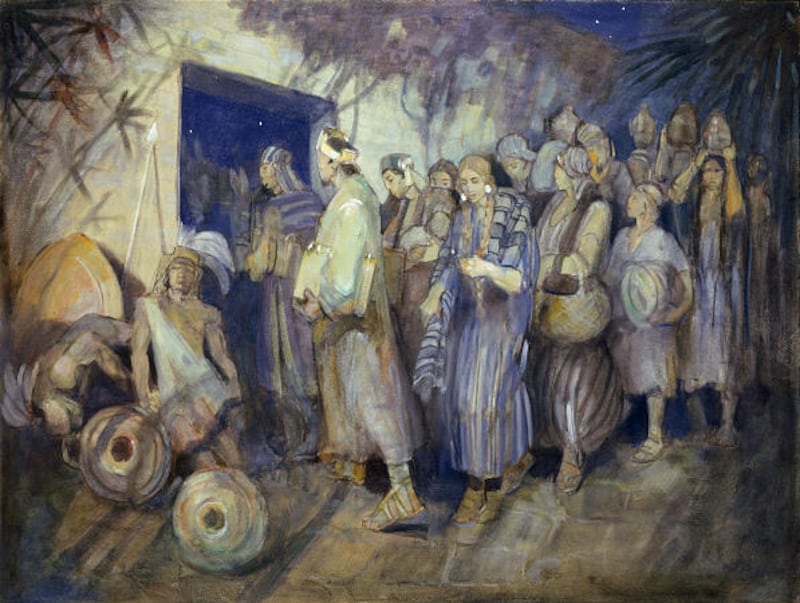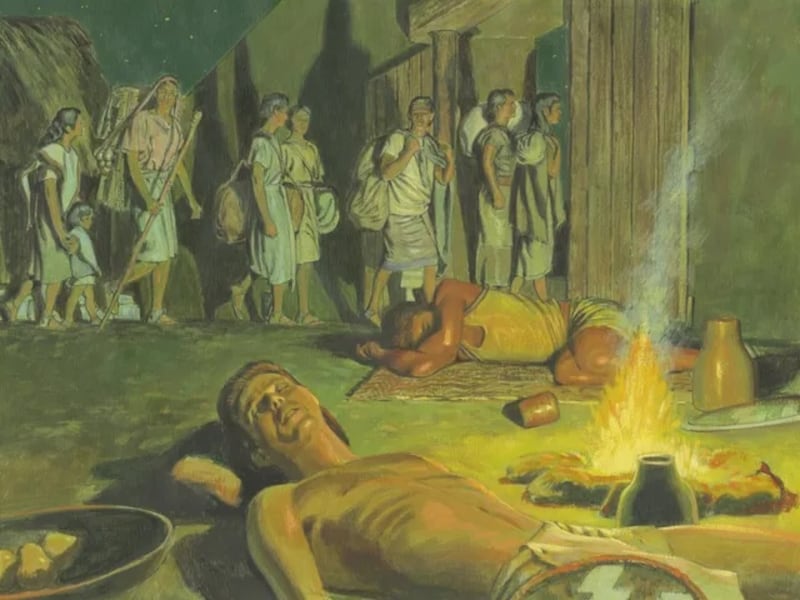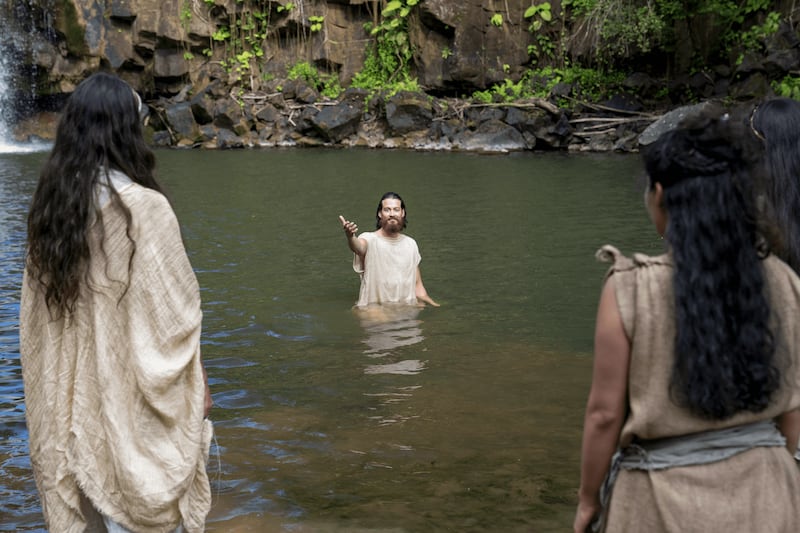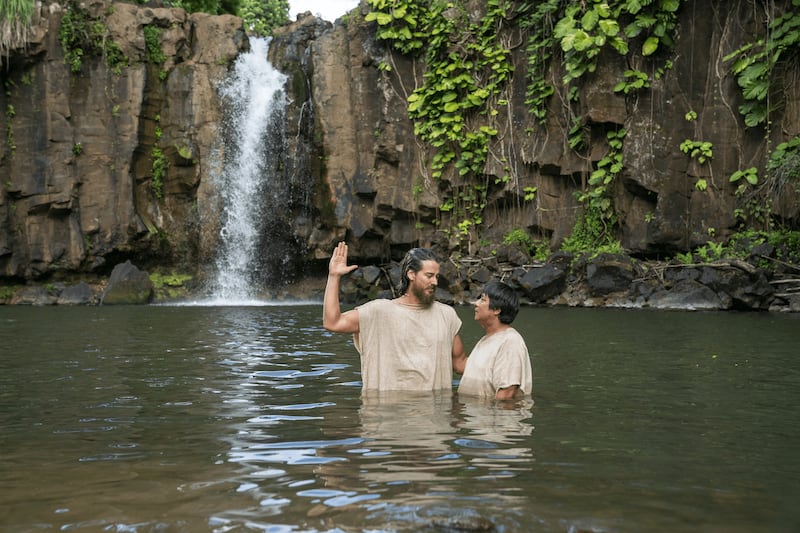This week’s “Come, Follow Me” study guide covers Mosiah 18-24, which includes Alma baptizing at the waters of Mormon and the deliverance of two groups from bondage.
Following are a few quotes from past and present Church leaders about these chapters.
Mosiah 18
“We could find no fault in the Church. On the contrary, we liked everything we saw very much. However, we still could not decide to be baptized because we wanted to know everything before doing so.
“But, even in our indecision, the Lord was patiently preparing us, He was molding us, and He was helping us to discover that we should learn to discern the truth not only through our rational minds but also through the very still and small voice of the Spirit, which speaks especially to our hearts.
“That voice and the resulting feeling came one evening after 10 months of learning the gospel, when we read in Mosiah 18, ‘As ye are desirous to … bear one another’s burdens, … and comfort those that stand in need of comfort, … if this be the desire of your hearts, what have you against being baptized in the name of the Lord?’ (Mosiah 18:8-10).
“That passage from the Book of Mormon entered our hearts and souls, and we suddenly felt and knew that there was really no reason not to be baptized. We realized that the desires mentioned in these verses were also the wishes of our hearts and that those things were what really mattered. They were more important than understanding everything because we already knew enough. We had always relied on the guiding hand of a loving Heavenly Father and were confident that He would continue to guide us.
“So, that same day, we set up a date for our baptism, and soon we were baptized, finally!”
— Elder Mathias Held, General Authority Seventy, April 2019 general conference, “Seeking Knowledge by the Spirit”
“Your power to do good as a group of God’s daughters will depend, to a great degree, on the unity and love that exist among you. This is another gift of peace that comes through the Holy Ghost.
“Alma understood this. That is why he pleaded with his people ‘that there should be no contention one with another, but that they should look forward with one eye, having one faith and one baptism, having their hearts knit together in unity and in love one towards another’ (Mosiah 18:21).
“Unity is necessary for us to have the Spirit in our class and in our family. But you know from experience, as I do, that such loving unity is hard to maintain. It takes having the Holy Ghost as a companion to open our eyes and temper our feelings.”
— President Henry B. Eyring, counselor in the First Presidency, April 2017 general conference, “‘My Peace I Leave With You’”
Mosiah 21
“When Limhi’s people had their fill of Lamanite abuses, they convinced their king to go against the Lamanites in battle. Three times Limhi’s people were defeated. Heavy burdens were laid upon them. Finally they humbled themselves and cried mightily unto the Lord that He would deliver them (see Mosiah 21:1–14.) Verse 15 of chapter 21 tells us of the Lord’s response: ‘And now the Lord was slow to hear their cry because of their iniquities; nevertheless the Lord did hear their cries, and began to soften the hearts of the Lamanites that they began to ease their burdens; yet the Lord did not see fit to deliver them out of bondage.’
“Soon after, Ammon and a small band of men from Zarahemla arrived, and with Gideon — one of the leaders of Limhi’s people — they worked out a plan which was successful, and they escaped from the Lamanite abuses. …
“These scriptures teach us of the Lord’s power of deliverance.
“Prophecies foretelling the life and mission of Jesus Christ promise us the deliverance that He will provide. His Atonement and Resurrection provide all of us an escape from physical death and, if we repent, an escape from spiritual death, bringing with it the blessings of eternal life.”
— Elder L. Tom Perry, then of the Quorum of the Twelve Apostles, April 2012 general conference, “The Power of Deliverance”

Mosiah 23
“Make use of adversity. Our trials help us discover and prepare for the work Heavenly Father has for us. Alma explained, ‘After much tribulation, the Lord … made me an instrument in his hands’ (Mosiah 23:10). Like the Savior, whose atoning sacrifice enables Him to succor us, we can use knowledge gained from difficult experiences to lift, strengthen and bless others.”
— Elder John C. Pingree Jr., General Authority Seventy, October 2017 general conference, “‘I Have a Work for Thee’”
“Hard is part of the gospel plan. One of the purposes of this life is for us to be proven. Few have suffered more undeservedly than the people of Alma. They fled from wicked King Noah, only to become slaves to the Lamanites! Through those trials the Lord taught them that He chastens His people and tries ‘their patience and their faith’ (Mosiah 23:21).”
— Elder Stanley G. Ellis, emeritus General Authority Seventy, October 2017 general conference, “Do We Trust Him? Hard Is Good”
“In the land of Helam, Alma’s people were frightened by an advancing Lamanite army.
“’But Alma went forth and stood among them, and exhorted them that they should not be frightened, but … should remember the Lord their God and he would deliver them.
“’Therefore they hushed their fears’ (Mosiah 23:27–28).
“Notice Alma did not hush the people’s fears. Rather, Alma counseled the believers to remember the Lord and the deliverance only He could bestow. And knowledge of the Savior’s protecting watchcare enabled the people to hush their own fears.
“Correct knowledge of and faith in the Lord empower us to hush our fears because Jesus Christ is the only source of enduring peace.”
— Elder David A. Bednar of the Quorum of the Twelve Apostles, April 2015 general conference, “Therefore They Hushed Their Fears”
“When a group of enslaved Book of Mormon peoples called upon God for deliverance, they used Israel’s cry during their captivity. Two such instances occurred within the colony that left Zarahemla under the leadership of Zeniff in order to reclaim the original Nephite homeland — an effort finally abandoned because of Lamanite oppression.
“The first of these groups to call upon the Lord was the group of 450 persons who, under the leadership of Alma the Elder, fled from King Noah and then settled in the land of Helam (see Mosiah 23:1–20). Eventually, they fell into bondage and sought deliverance of the Lord (see Mosiah 23:21–24:25). The second group, the people of King Limhi, found that even a series of armed rebellions could not free them from being slaves to the Lamanites (see Mosiah 21:2–13). In the aftermath of defeat, ‘they did cry mightily to God … that he would deliver them out of their afflictions’ (Mosiah 21:14).
“In each instance, the Exodus was held up as proof that God can and will rescue his people. ‘Put your trust in … that God who brought the children of Israel out of the land of Egypt,’ Limhi pleaded with his people (Mosiah 7:19).
“But the Exodus served as more than an affirmation of God’s power for these two groups in bondage. It provided a pattern for their escape as well. In each instance, the Lord controlled events and opened the way for escape, just as he had done for ancient Israel. For example, he softened the hearts of the captors just as he had softened Pharaoh’s heart by means of the plagues (see Mosiah 21:15; Mosiah 23:29). Finally, they escaped with their property, specifically their ‘flocks and herds’ — no small feat (see Mosiah 22:10–11; Mosiah 23:1; Mosiah 24:18). …
“Obviously, both the people of Limhi and the group with Alma saw the Exodus as a model for their own experiences. It gave them courage that the Lord would deliver them as he had the ancient Israelites.”
— S. Kent Brown, Brigham Young University professor emeritus of ancient scripture, in the March 1994 Liahona article “The Exodus: Seeing It as a Test, a Testimony and a Type”

Mosiah 24
“When we agree to believe in the truth and to follow it, and when we make an effort to become true disciples of Jesus Christ, we do not receive a certificate with a guarantee that we will not make mistakes, that we will not be tempted to walk away from the truth, that we will not be criticized or even that we will not experience afflictions. But the knowledge of the truth teaches that … we will never be alone when we go through afflictions, for God visits His people in the midst of their afflictions (see Mosiah 24:14).”
— Elder Denelson Silva, General Authority Seventy, October 2022 general conference, “Courage To Proclaim the Truth”
“Healing blessings come in many ways, each suited to our individual needs, as known to Him who loves us best. Sometimes a ‘healing’ cures our illness or lifts our burden. But sometimes we are ‘healed’ by being given strength or understanding or patience to bear the burdens placed upon us.
“The people who followed Alma were in bondage to wicked oppressors. When they prayed for relief, the Lord told them He would deliver them eventually, but in the meantime He would ease their burdens ‘that even you cannot feel them upon your backs, even while you are in bondage; and this will I do that ye may stand as witnesses … that I, the Lord God, do visit my people in their afflictions’ (Mosiah 24:14). In that case the people did not have their burdens removed, but the Lord strengthened them so that ‘they could bear up their burdens with ease, and they did submit cheerfully and with patience to all the will of the Lord’ (verse 15).
“This same promise and effect applies to you mothers who are widowed or divorced, to you singles who are lonely, to you caregivers who are burdened, to you persons who are addicted and to all of us whatever our burden.”
— Then-Elder Dallin H. Oaks, now first counselor in the First Presidency, October 2006 general conference, “He Heals the Heavy Laden”
“Life may not always be exactly what we had in mind, but we are not alone. This special promise is recorded in Mosiah: ‘Lift up your heads and be of good comfort. … And I will … ease the burdens … upon your shoulders, that even you cannot feel them upon your backs, even while you are in bondage; and this will I do that ye may stand as witnesses for me hereafter, and that ye may know of a surety that I, the Lord God, do visit my people in their afflictions’ (Mosiah 24:13, 14).
“Isn’t that beautiful?
“I know that our Heavenly Father keeps his promises. I, like you, have been sorely tried in a variety of ways. But this kind of seasoning teaches us that every burden on the back can become a gift in the hand.”
— Sister Elaine Cannon, then Young Women general president, April 1982 general conference, “Reach for Joy”




